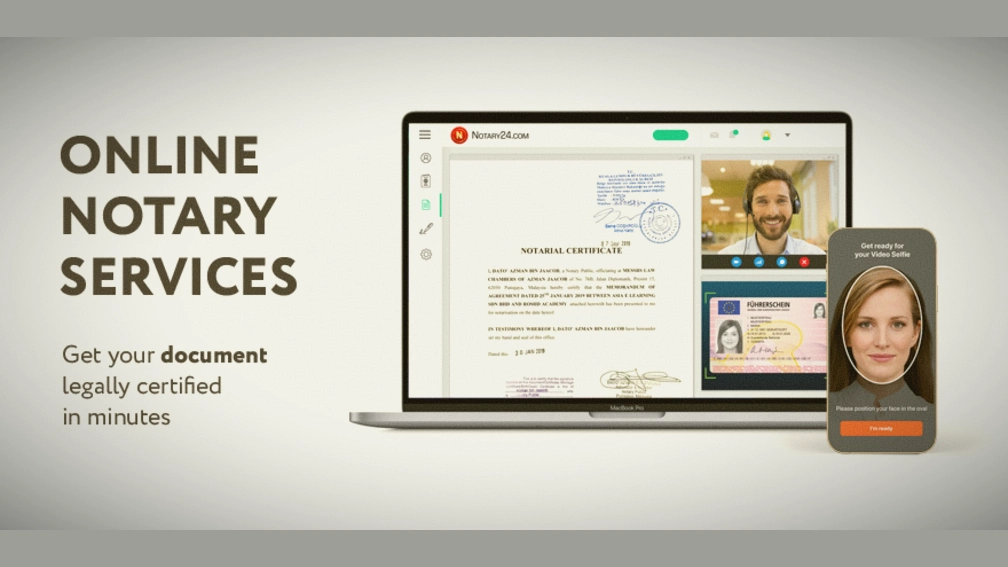Legal paperwork is part of everyone’s life since the moment we are born. The first document we get is the birth certificate. From that moment on, we use various services and authorities to get the documents we need at that particular moment.
Many situations require a document issued and signed by a notary. Traditional notary services require a signature from the official person, but today, so many things happen online, and even an apostille is issued digitally. Things are moving forward, and the legal matters are part of this change. It is now simple to notarise a document with an online notary service..
The Shift from Traditional to Online Notarisation
You won’t find a notary on every corner. There’s only a handful of them in every city, and smaller places have none. These people need to travel long distances to find one, wait in lines, and return to their place of residence. Sometimes, you will lose an entire day just doing this.
The shift from traditional to modern happens by digitalising the industry. Today, online notarisation is normalised in many parts of the world, and the UK is headed towards that road. Remote online notaries will ask for video calls to verify your identity, but this is still much simpler than traveling and getting them physically.

What Is an Online Notary Service?
The online notary service does everything a traditional one is doing, but remotely. Think of it as a virtual notary office that will give you the stamp you need without showing up to their physical office. In other words, you can now notarise a document swiftly.
They will provide you with an electronic signature or a digital certificate if you meet all the requirements and you’re eligible for them. To do this, they must perform certain checks. Some of them require a video call, others use a QR code, and some even a blockchain procedure.
Remote Online Notarisation (RON)
The Remote Online Notarisation practice, or simply RON, is the most advanced service in this industry. It allows professionals to do their jobs seamlessly through the internet, and users of their services to get what they need without even leaving their front door. This method is especially beneficial when people need notarisation and they are in another country, but it is used by everyone because it saves time and energy for both parties.
Electronic Notarisation (eNotary)
Electronic notarisation, also known as e-notary, takes a hybrid approach. You must still appear in front of the notary public in person, but the signing and notarisation process is carried out using electronic signatures rather than paper. It reduces reliance on paper-based notarisation while maintaining the physical presence requirement. e-Notary is commonly used for domestic transactions where digital records are preferred for security and storage.
Traditional Notarisation
Traditional notarisation is the ritual we all know, sitting across from a notary public, handing over your documents, and signing as they apply the official seal. There’s something grounding about it: the weight of the paper, the stamp pressing into the document, the sense that this is a step recognised around the world. For documents that require recognition or an apostille internationally, it’s still the most dependable, universally accepted method.
Online vs Traditional Notary Services
| Feature | Traditional | eNotary | Remote Online Notary (RON) |
|---|---|---|---|
| In-person meeting required | ✅ | ✅ | ❌ |
| Uses a digital signature | ❌ | ✅ | ✅ |
| Video conferencing | ❌ | ❌ | ✅ |
| Accepted abroad easily | ✅ | ⚠️ Limited | ⚠️ Limited |
| Convenience (home/office) | ❌ | ❌ | ✅ |
Top Benefits of Using Online Notary Services
There are many benefits from using online notarisation. It is especially beneficial for people who are unable to show in front of the notary personally, but it offers many various benefits for all other individuals or companies. This method is excellent because it saves time and money, provides a seamless procedure, and offers simple remote authentication methods. There’s no better way of solving an issue when you need a quick solution for a problem that requires the use of a notary.
- Domestic: In the UK, online notaries are not entirely recognised, but when it comes to domestic use, people can use their services in many ways. If there’s no need for international recognition, businesses and individuals can get digitally signed contracts or agreements without problems.
- International: When it comes to documents for international use, online notarisation is more complex, but still possible. The UK has strict rules, which are not useful in most situations, but many other countries worldwide offer online notary services without problems. Using them, you can get e-notary or e apostille certificates seamlessly.
- Speed and Cost Benefits: One of the strongest advantages of online notarisation is speed. A remote notary can be connected via video in minutes, making it possible to finalise urgent agreements without delay. This efficiency also reduces costs, as there is no need to travel or arrange repeated appointments.
Legal Validity and Global Recognition
The legal validity of online notarisation depends on the jurisdiction where the document will be used. In the UK and many other regions, online notarisation is possible for a variety of types of documents, but for international notary service needs, traditional notarisation and apostille remain more widely accepted. An e-apostille can sometimes be used to bridge the gap, though it is not universally recognised.
Where Online Notarisation (RON) Is Recognised?
| Region | Countries Recognising RON | Insights |
|---|---|---|
| North America | United States, Canada, Mexico | Widespread adoption; U.S. led the way. |
| Europe | United Kingdom, Estonia, Germany, France, Spain, Italy | Estonia is a digital pioneer; Western Europe catching up. |
| South America | Brazil | One of the first Latin American adopters. |
| Asia-Pacific | India, Philippines, Australia | Rapidly growing due to global workforce mobility. |
| Middle East | United Arab Emirates | UAE positions itself as a digital innovation hub. |
| Other Regions | Not widely recognised yet | Many African and Central Asian countries are still evaluating adoption. |
Security, Trust, and Technology Behind Online Notaries
The trustworthiness of online notarisation depends on technology. To verify your identity, platforms use biometrics, knowledge-based authentication, and two-step verification. Once the document is signed, encryption and digital certificates protect its integrity. Audit trails and video recording ensure the process remains transparent and compliant. These safeguards provide confidence that notarising documents online is secure and legally valid, even when done remotely using electronic signatures.
- ID Verification (biometrics, KBA, two-step authentication)
- Encryption and Digital Certificates
- Audit Trails and Video Recording
Risks
Despite its benefits, online notarisation carries certain risks. Not all countries accept documents notarised online, which can cause delays if international recognition is needed. Technical issues may also disrupt an online session, and users must ensure they are connected with a licensed notary public. Additionally, some organisations still prefer traditional methods, especially when sensitive or high-value contracts are involved.
The Future of Notarisation
The future of notarisation is moving steadily towards digital-first solutions. With e-notary and e-apostille services gaining traction, more countries are likely to adopt frameworks that recognise documents notarised online. While traditional paper-based notarisation will remain relevant for when documents require broad international recognition, the balance is shifting towards online services as technology and trust continue to grow.
FAQs
Can I use an online notary for immigration documents in another country?
This depends on the country’s legal requirements. Some immigration authorities accept documents notarised online, while others require traditional notarisation with an apostille for international use.
Are online notarised wills or real estate contracts always valid?
Online notarisation can be valid for wills and property contracts, but recognition varies by jurisdiction. You must confirm whether the local laws in your region or abroad accept documents notarised online.
How do I confirm if my country accepts online notarisation?
You should consult with a notary public in your jurisdiction or seek guidance from an apostille service. They can confirm whether online notarisation is possible for your type of document.
What extra steps are needed if my online-notarised document must be apostilled?
If a document notarised online must be used abroad, you may need an e-apostille. However, some countries still require the traditional process of notarisation and apostille. Always confirm with the receiving authority.




